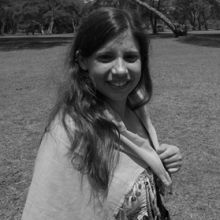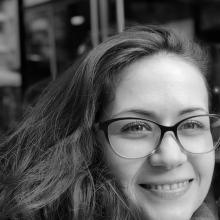Laboratório de Psicolinguística
The research on psycholinguistics began, at Faculdade de Letras (FLUL), in the early eighties. Professor Isabel Hub Faria was a pioneer researcher in this field, with her first studies on paranoid schizophrenic discourse, initiated in collaboration with Prof. Maria Luísa Figueira, from the Faculdade de Medicina (FMUL). Data collection and analysis was carried out by the students of the first MA that took psycholinguistic processes in language production as a central topic. The MA that FLUL offered back in 1987, supervised by Isabel Hub Faria, with the collaboration of a multidisciplinary team (psychology, health sciences, discourse analysis, grammar, statistics) led to the production of several dissertations on psycholinguistic subjects: language acquisition and processing, reading, speech perception and dichotic audition, second language learning, among others. By that same time, the Grupo de Estudos de Linguagem e Cognição (Group for the Study of Language and Cognition) was founded, gathering people from Cybernetics, Mathematics, Psychology and Linguistics, including researchers, professors and post graduating students. It contributed to further the research in this area of knowledge, which was very new in Portugal. The first studies on language acquisition and development took place, leading to important PhD dissertations (Freitas 1998, Batoréo 1997), that set a landmark for the work on child language corpora, namely with the indexation to CHILDES data base. It should be mentioned that we promoted the first conference on child language (First and second Lisbon Meeting on Child Language, University of Lisbon with Special Reference to Romance Languages, 1994 and 2004) that brought to Portugal important names in psycholinguistic research on language acquisition, such as Dan Slobin, Elisabeth Bates, Ruth Berman, Michèle Kail, among others.
By the end of the 80s, the research on Psycholinguistics reached a more formal status with the creation of a research branch inside Centro de Linguística da Universidade de Lisboa (CLUL), and our lab gained a working space at FLUL, named “Laboratório de Psicolinguística”.
Since the early nineties, several individual projects were developed and produced MA and PhD dissertations (on language acquisition and development, language processing, reading, language disorders, speech perception and production, Portuguese sign language, second language learning, among others); several collective projects on central topics of psycholinguistics were also carried out, funded by FCT and FCG, and by bilateral protocols between institutional instances for research (like the protocols of scientific and technique cooperation with Brazil and France). In the domain of human language processing, we can highlight projects on comprehension and production of Portuguese, taking into account typical and atypical development, projects on specific grammar properties of European Portuguese, and on linguistic variation (European vs, Brazilian Portuguese). In the domain of clinical linguistics, studies on particular clinical linguistic profiles were completed: speech production in cleft palate conditions, reading and stuttering, reading and visual deficits, language processing and auditory language disorders. In educational linguistics, we have developed projects on reading acquisition, comprehension, fluency, etc.
Along these last decades, we made a great effort towards internationalization, either by collaborations with foreign research centers or by inviting internationally renowned researchers to come to the PL, in the frame of diverse scientific meetings. It is worth mentioning some research partnerships, such as those with Michèle Kail and the Laboratoire Cognition et Développement (CNRS, UMR, 8605, Univ. Paris V - René Descartes), with Marcus Maia and LAPEX, Laboratório de Psicolinguística Experimental (UFRJ, Brazil), or with Melissa Bowerman and the Max Plank Institute for Psycholinguistics. Since the beginning of the PL until today, we continue to have close collaboration with national medical and psychology schools, which has allowed us to go beyond our laboratorial availability.
PL researchers participate actively in MA and PhD post-graduation programs within the Universidade de Lisboa, such as Linguistics (FLUL), Cognitive Science (FLUL+FCUL), Voice, Language and Communication (FLUL+FMUL). They supervise a large number of dissertations, from these programs and from programs of other universities, such as Universidade do Minho, Universidade de Aveiro, and Universidade Católica Portuguesa, etc.
In order to implement experimental research, PL has progressively increased its research facilities. We have well equipped laboratorial facilities, where it is possible to prepare experiments and to obtain behavioral data from eyetracking or reaction times, or to obtain high quality acoustic data in a semi anechoic chamber that allows our researchers to study speech perception and production.
Isabel Hub Faria directed the Psycholinguistics Lab until 2009. Armanda Costa directs it since then.
Membros
Investigadores integrados com doutoramento
Investigadores integrados sem doutoramento
Colaboradores
Concluídos
| Projeto | Data | Fin. |
|---|---|---|
| Compreensão na Leitura. Processamento de Palavras, Frases e Textos | - | FCT
|
| Recursos | Tipo |
|---|---|
| Economics e-Translations into and from European Languages | Base de dados |
| LumaLiDaOnLexicon | Léxico |
| O guia de pronúncias em português - Port_ProDi | Base de dados |
. (1989). Aprender a ler e a escrever. Algumas Implicações. Revista Internacional De Língua Portuguesa. |
. (2005). Periplo pola fraseoloxía portuguesa: abordaxe lexicográfica. . |
. (1992). Les expressions idiomatiques correspondantes: une analyse comparative. . |
. (2014). Processamento e interpretação de sujeitos nulos e plenos em Português Europeu e em Português do Brasil. Cadernos De Letras Da Uff. http://doi.org/http://dx.doi.org/10.22409/cadletrasuff.2014n49a7 |
. (2011). Reading hybrid texts: Remarks on text/image transitions. Journal Of Eye Tracking, Visual Cognition And Emotion. Retrieved from http://hdl.handle.net/10437/2308 |
. (2011). Using eye-tracking to study anaphoric relations processing in European Portuguese. Journal Of Eye Tracking, Visual Cognition And Emotion, 1, 41-49. Retrieved from http://hdl.handle.net/10437/2310 |
. (2011). Using eye-tracking to detect reading difficulties. Journal Of Eye Tracking, Visual Cognition And Emotion. Retrieved from https://revistas.ulusofona.pt/index.php/JETVCE/article/view/2049 |
. (2012). Processamento da correferência e sujeitos anafóricos – dados sobre o Português Europeu e Brasileiro. Revista Linguística - Correferência Anafórica: Representação, Aquisição E Processamento, 8(2). http://doi.org/https://doi.org/10.31513/linguistica.2012.v8n2a4558 |
. (1991). Free topic. . |
. (1998). Inflected Infinitives Revisited – Genericity and Single Event. . |
. (2001). Padrões de interrogativas-Q no Português Europeu e no Português Brasileiro: uma análise inter e intra-lingüística. Boletim Da Associação Portuguesa De Lingüística, Número Especial I, Ii Congresso Internacional Da Abralin, 26, 400-404. |
. (2002). Topic vs. Comment In Some Subject Inversion Sentences In French And Portuguese. Journal Of Portuguese Linguistics, 1. |
. (2008). On some special adverbs, word order and CP. Variation Vs. Micro-Variation. Canadian Journal Of Linguistics – Revue Canadienne De Linguistique, 53. |
. (2016). Exploring memory issues with the brand names of medicines. International Journal Of Pharmacy And Practice, 24. Retrieved from http://labfon.letras.ulisboa.pt/files/Cavacoetal\_2016\_IJPP.pdf |
. (2014). Landmarks of Economic Terminology: The First Portuguese Translation of Elémens du commerce. History Of European Ideas, 40. Retrieved from http://dx.doi.org/10.1080/01916599.2014.968334" |
. (2002). Para uma tipologia de erros. . |
. (1982). Contribuições para o Estudo do papel da escola primária na orientação para o significado. . |
. (2007). Grão a grão enche o provérbio a tradição. Polifonia, 10. |
. (2005). e P. Torres (2005). Automatismos Lexicais E Resistência À Tradução: O Caso Dos Falsos Amigos. Polifonia, 8. |
. (2005). & R. Andrade (2005). Traduction Et Créativité: La Langue De Mia Couto. Polifonia, 8. |
. (2003). As cores preto no branco: uma análise comparativa. Polifonia, 6. |
. (2002). Da palavra às palavras: alguns elementos para a tradução das expressões idiomáticas. . |
. (2001). Estar na lua: être dans la lune ou sur la lune? Expression de l espace et représentations du monde. Polifonia, 4. |
. (2001). Algumas reflexões em torno das expressões idiomáticas enquanto elementos que participam na construção de uma identidade cultural. . |
. (1999). La création et les jeux de langage. Du Proverbe À L Expression Idiomatique. Identité Et Altérité. Polifonia, 2. |
. (1997). Despedir-se à francesa/filer à l anglaise. Reflexões Em Torno Da Tradutologia Das Construções Fraseológicas Na Perpetiva Interlínguas. Polifonia, 1. |
. (2017). Como o cérebro processa a informação semântica em indivíduos com e sem Perturbações do Processamento Auditivo (Central): da investigação ao ensino e à prática clínica. Ciências Aplicadas: Coletânea De Estudos, 1, 165-187. |
. (2018). Efeitos de animacidade do antecedente na resolução de pronomes sujeito. Revista Da Associação Portuguesa De Linguística, 4. http://doi.org/doi.org/10.26334/2183-9077/rapln4ano2018a40 |
. (2018). Adaptation in pronoun resolution: Evidence from Brazilian and European Portuguese. Journal Of Experimental Psychology: Learning, Memory, And Cognition, 44(12), 1986-2008. http://doi.org/http://dx.doi.org/10.1037/xlm0000569 (Original work published 04/2018AD) |
. (2018). Complexidade Morfológica e Custos de Processamento Lexical. Alfa, Revista De Linguística, 62(1). |


















